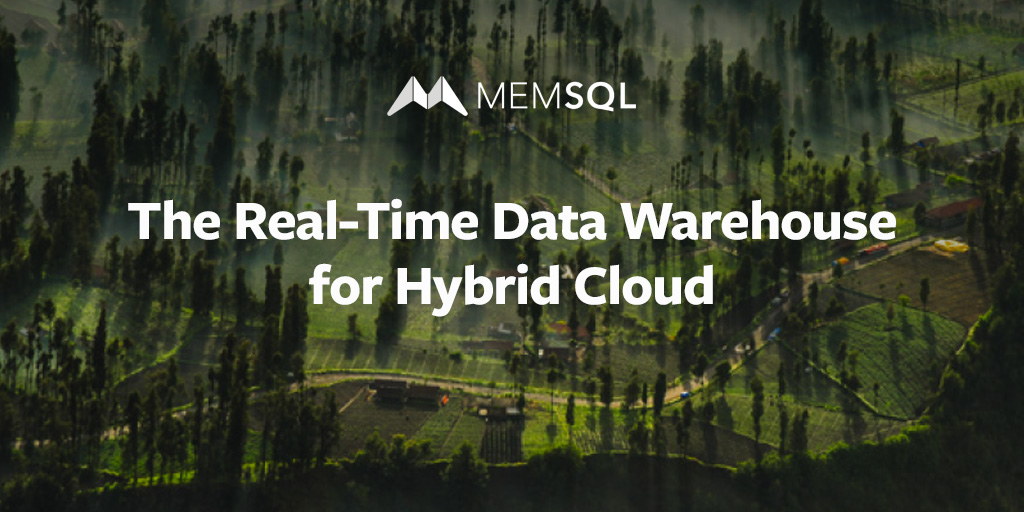
As companies move to the cloud, the ability to span on-premises and cloud deployments remains a critical enterprise enabler.
In this post, we’ll review the basics of a hybrid cloud model for SingleStore deployments to fit conventional and future needs.
SingleStore Background
SingleStore is a real-time data warehouse optimized for hybrid cloud deployments, and excels at operational use cases. SingleStore users are drawn to the ability to load and persist live data at petabyte scale while simultaneously querying that data in real-time.
SingleStore supports deployment on any cloud including offering a managed service called Singlestore Helios. Today, nearly half of SingleStore customers use cloud offerings in production or test and development deployments. On-premises SingleStoreDB Self-Managed can be installed and managed by the enterprise.
An Introduction to the SingleStore Hybrid Cloud Model
The SingleStore model begins with the fundamental design principle of a flexible software footprint. With this principle, SingleStore can be run on-premises and in the cloud.
SingleStore in the Cloud
In the cloud, SingleStore offers a managed service where customers can use the database, but do not have to administer the service. This provides any company with the ability to benefit from SingleStore scale and performance, with SingleStore handling cluster operations. When run in the cloud, SingleStore takes advantage of the cloud platform such as low cost scalable storage to store backups and data, and readily available compute to scale query performance and concurrency. SingleStore can also run on any cloud infrastructure-as-a-service.
SingleStore Self-Managed
On-premises SingleStoreDB Self-Managed runs on any modern Linux operating system. It can run on one or hundreds of nodes. There are no dependencies on any hardware, and no dependencies on any cloud provider.
Building on this architectural premise, SingleStore has evolved to have the most advanced database deployment models available.
Building on the flexible software footprint, SingleStore can be deployed:
- on any server, with a minimum of 4 cores and 8GB of RAM
- on any modern version of Linux
- within a virtual machine
- within a container for test and development
- on any public cloud provider’s infrastructure-as-a-service platform
- as a cloud service, managed by SingleStore
This unparalleled flexibility allows enterprises to make big bets on their analytics infrastructure while simultaneously controlling deployment and cost levers throughout the lifetime of an application.
Sample Hybrid Cloud Scenarios
With hybrid cloud as an umbrella, SingleStore fits on-premises, hybrid-cloud, and multi-cloud deployments. Let’s look at each in further detail.
Self-Managed Flexibility
Many sensitive workloads require an on-premises deployment which SingleStore easily accommodates. When large amounts of data are produced locally, like for manufacturing analytics, an on-premises model often makes sense.
In addition to running on any Linux, SingleStore provides multiple capabilities for on-premises deployment to shine.
- Any industry standard hardware
- Architects can choose the CPU, memory, flash, and disk options that suit their needs
- NUMA Optimizations
- Scale-up, multi-core servers can be put to full use
- Advanced Vector Extensions (AVX) optimizations
- SingleStore takes advantage of the latest Intel and AMD features
- Any standard Linux
- For flexibility across environments in large organizations
- Virtual Machine Ready
- SingleStore can easily run in a virtual machine with local or remote storage
- Containers
- SingleStore can easily in a Docker container, an ideal way to do development and testing. Running stateful systems like databases within containers for production workloads is still an emerging area.
Together these deployment characteristics make SingleStore an ideal platform for enterprises looking to streamline data center infrastructure.
End of the Appliance
In particular for on-premises workloads, many companies find SingleStore to be an ideal replacement for proprietary appliances. These appliances may originate from the database side such as with Oracle Exadata or SAP HANA. They also frequently come from the data warehouse side such as Netezza or Vertica. In all cases, these customers can realize immediate cost savings of millions of dollars by moving to a database platform like SingleStore covering these workloads with a pure software approach.
Hybrid Cloud Deployments
SingleStore deployments span from on-premises to cloud. That flexibility begins with the simplicity of the replicate database command.
Replicate Database
SingleStore includes the ability to replicate a database from one SingleStore cluster to another SingleStore cluster with a single command. The two clusters do not have to be the same configuration. However, the receiving cluster must have enough capacity to absorb the data being replicated to it.
High Availability and Disaster Recovery in the Cloud
SingleStore replicates data locally within a single cluster across multiple nodes for instant high availability, but additional layers of availability, including disaster recovery, could be deployed by replicating the SingleStore database to the cloud.
Test and Development
Other cloud uses include test and development where data architects can rapidly deploy SingleStore clusters to test a variety of workloads. Experiments can be run to determine the advantages of one instance type over another. Ultimately those deployments can migrate on-premises with much of the heavy lifting already accomplished.
Multi Cloud
Multi cloud deployments are an extension of hybrid cloud and offer provider flexibility. SingleStore can be deployed across several popular clouds such as Amazon Web Services, Microsoft Azure, Google Compute Platform, Digital Ocean and others. This range of choice leaves companies in an advantageous position to make long-term bets on data infrastructure without being tied to a single provider.
Charting An Self-Managed to Cloud Security Plan
One of the reasons often cited against moving to the cloud is the lack of an appropriate security model. Understandably, companies want to have this model in place before moving to the cloud.
SingleStore includes robust security mechanisms such as
- encryption
- auditing
- role based access control
- data use and database architect separation (to help protect against insider threats)
In addition, SingleStore has passed security audits allowing it to retain the most sensitive data at the world’s largest organizations.
The SingleStore security model exists in any deployment. Organizations that begin with a comprehensive security model for an on-premises deployment have the option to retain that model as they move to the cloud.
Managing SingleStore
SingleStore provides a range of management capabilities for easy administration including
Singlestore Helios
SingleStore offers a managed service where customers can consume the database, but do not have to administer the service. This provides any company with the ability to benefit from SingleStore scale and performance, while SingleStore handles the cluster operations.
SingleStore Ops
To quickly provision, manage, and monitor SingleStore clusters
Cloud formation templates
To quickly deploy SingleStore on services such as AWS
Fit with configuration management tools
SingleStore can easily be deployed using configuration management tools like Puppet or Chef
A Comprehensive Approach for Hybrid Cloud Deployments
SingleStore remains the only scalable, real-time data warehouse to provide for all deployment models
- on-premises with complete hardware and virtual machine flexibility
- cloud deployments on any provider’s infrastructure-as-a-service
- a cloud service management by SingleStore
With large companies spending millions to hundreds of millions on database and data warehouse infrastructure, the opportunities to consolidate to a single platform deployed multiple times for multiple use cases is financially compelling.
Start Your Hybrid Cloud Deployment Today
To get started with SingleStore, please visit www.singlestore.com






